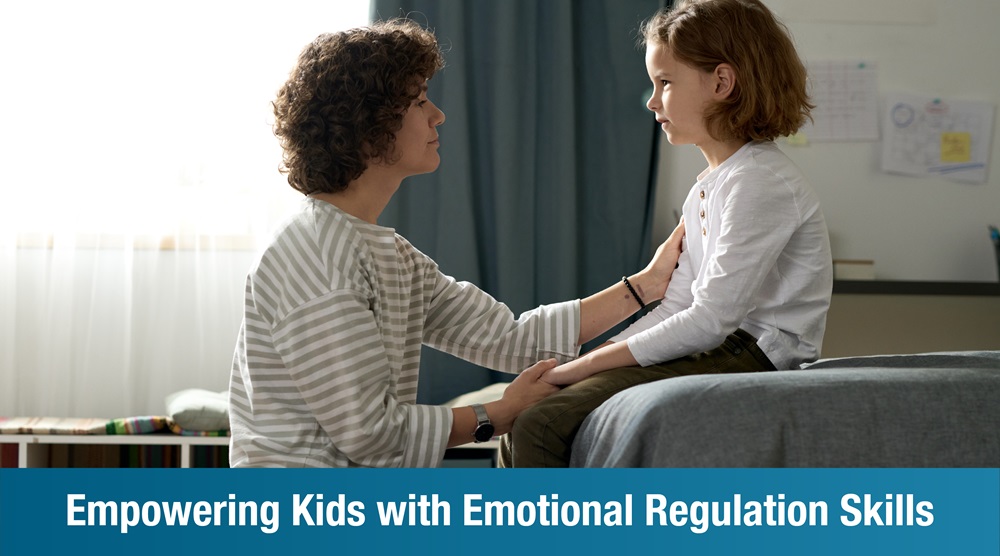
Empowering Kids with Emotional Regulation Skills
Children may have emotional outbursts at a young age, but if these persist into school age, they may need guidance. Since traditional education doesn’t typically teach emotional expression, children often struggle to manage their feelings. Emotional regulation, as taught in occupational therapy, equips children with tools to control their emotions in a healthy way. Let’s explore the key elements of emotional regulation and how it can support your child’s emotional development.
What is Emotional Regulation?
According to the American Psychological Association, emotional regulation refers to a person’s ability to monitor and moderate their emotions. It can occur before the feeling actively develops, while the feeling is in process, or after the feeling has subsided. Broadly, there are two types of emotional regulation:
- Implicit: This is an unconscious practice, and involves tempering the extent with which one feels an emotional response.
- Explicit: This involves consciously monitoring one’s emotions and working to express them more appropriately. It can include altering an emotion for a more positive response, reframing one’s perspective to view a situation more positively, or recognising and practicing the behaviors that can improve one’s emotional state.
With emotional regulation, children learn to navigate tough situations such as dealing with disappointment, calming down during an upsetting time, and controlling their temper when something makes them angry.
Why is Emotional Regulation Important?
Life is unpredictable for the most part, and every child will face many unexpected hurdles and disappointments as they grow older. At a young age, the instinctive response to such hurdles may be to cry or to start screaming. This, however, is neither appropriate nor useful, particularly as the child grows older and participates more in social settings. Moreover, many parents take on the job of soothing their children every time they have an outburst rather than helping them find ways to self-soothe. This leads to negative consequences, as children grow up relying on their parents to regulate their emotions and cannot do it on their own.
 Emotional regulation, when taught with care and patience, helps children face difficult situations calmly and respond in a mature fashion that is solution-oriented and not impulsive. When they encounter any stimulus that upsets them, they learn to slow down and choose an emotional response with care. Particularly when interacting with others, emotional regulation helps children respond in a manner that is considerate to the other person, which makes for better relationships with friends, colleagues, teachers, and family members over time. It also promotes mental health, as children learn to deal calmly with tough situations rather than giving in to unrestrained emotion.
Emotional regulation, when taught with care and patience, helps children face difficult situations calmly and respond in a mature fashion that is solution-oriented and not impulsive. When they encounter any stimulus that upsets them, they learn to slow down and choose an emotional response with care. Particularly when interacting with others, emotional regulation helps children respond in a manner that is considerate to the other person, which makes for better relationships with friends, colleagues, teachers, and family members over time. It also promotes mental health, as children learn to deal calmly with tough situations rather than giving in to unrestrained emotion.
Emotional Regulation in Different Stages of Childhood
Emotional regulation develops gradually as children grow. In early childhood, emotions are typically expressed through crying or tantrums. As children enter school, they should start learning to express emotions more appropriately in social settings. Adolescence requires more advanced regulation skills to navigate complex emotions and relationships.
Signs of Emotional Regulation Difficulties
Persistent meltdowns, outbursts, or aggressive behavior may indicate emotional regulation difficulties. These children may also struggle with impulse control, experience heightened sensitivity to disappointment, or have trouble calming down after being upset.
Key Strategies to Teach Emotional Regulation
When teaching emotional regulation as part of Occupational Therapy, it is important to treat it as a skill to be taught, rather than a correction of bad behavior. This will help children view it positively and learn it eagerly rather than out of compulsion. Some of the tools that help with inculcating emotional regulation include:
- Self-awareness: This involves slowing down and providing calm feedback on what the child did wrong and how they can do it differently. The better a child understands what constitutes a ‘good’ emotional response, the likelier they are to do it themselves.
- Scaffolding: This involves providing a supportive framework to encourage a behavior that the child may not want to exhibit. For instance, if children throw tantrums about doing their homework, parents can help them out with one part and then step back to let the child figure it out. Whenever they feel frustrated, they can be allowed to take a break, and parents should praise the effort being made.
- Practice runs: This is particularly helpful if children tend to act out in specific situations. For instance, if children are prone to throwing tantrums at the supermarket, parents can take their children on a visit without actually buying anything, to teach them how to walk quietly, how to not take things from shelves, how to not throw tantrums about buying treats, and so on.
Activities to Support Emotional Development
- Role-playing: Enact different scenarios to practice positive emotional responses.
- Art Therapy: Encourage children to express emotions through creative activities.
- Journaling: Writing about emotions helps children reflect and better understand their feelings.
Handling Meltdowns and Intense Emotions
Tantrums and emotional meltdowns are part of childhood, but consistent guidance can help minimize their intensity. Prepare children with coping mechanisms like taking deep breaths or counting to ten when they feel overwhelmed.
Step-by-Step Guide During a Child’s Emotional Meltdown
- Stay Calm: Model emotional regulation by staying composed.
- Provide Space: Give the child room to express emotions without judgment.
- Use Simple Language: Help them understand their feelings with simple, soothing words.
- Guide with Patience: Offer solutions or distractions once the emotion subsides.
- Discuss the Situation: Afterward, talk calmly about the situation to reinforce learning.
How to Remain Calm and Supportive During Intense Emotional Expressions
- Take deep breaths and stay composed
- Acknowledge the child’s emotions with empathy
- Avoid punitive responses during meltdowns, which can escalate the situation
Why a Daily Routine Matters for Emotional Regulation
Routine provides children with predictability, which fosters emotional stability. When children know what to expect, they can handle emotions more calmly. Incorporating downtime and physical activity into a daily schedule helps balance emotional needs.
By teaching children emotional regulation skills, we empower them to navigate life’s challenges with resilience and maturity. With the right guidance, they can build strong emotional foundations for a healthy, happy life.
Reach out to Team Plexus to understand more about emotional regulation.
- WhatsApp: +91 89048 42087
- Call: +91 78159 64668 (Hyderabad) | +91 82299 99888 (Bangalore)
FAQs
What is the help strategy for emotional regulation?
Help children practice emotional labeling, mindfulness, and appropriate responses.
What are the 5 steps to regulate emotions?
Recognize emotions, label them, slow down, choose a healthy response, and reflect afterward.
What are the six emotion regulation strategies?
Self-awareness, mindfulness, reframing, deep breathing, positive self-talk, and behavioral changes.
How to train emotional regulation?
Use consistent emotional awareness exercises and offer positive reinforcement for self-regulation.
What are the best exercises for emotional regulation?
Deep breathing, role-playing, mindfulness activities, and physical exercise like yoga.










